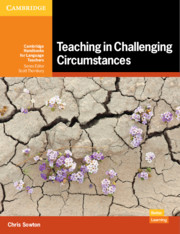Book contents
- Frontmatter
- Contents
- Thanks
- Acknowledgements
- Introduction
- I Creating a good environment for language learning
- II Being effective in the classroom
- III Teaching large classes
- IV Teaching language skills and systems
- V Teaching language without textbooks
- VI Teaching language with textbooks
- VII Helping students achieve their potential
- VIII Linking the school to the outside world
- IX Supporting yourself and others
- Glossary
- Index
19 - Using technology effectively
Published online by Cambridge University Press: 22 September 2021
- Frontmatter
- Contents
- Thanks
- Acknowledgements
- Introduction
- I Creating a good environment for language learning
- II Being effective in the classroom
- III Teaching large classes
- IV Teaching language skills and systems
- V Teaching language without textbooks
- VI Teaching language with textbooks
- VII Helping students achieve their potential
- VIII Linking the school to the outside world
- IX Supporting yourself and others
- Glossary
- Index
Summary
Technological solution[s] might mitigate some of the ill-effects of poverty and isolation experienced by many students in Kenya and elsewhere in the world.
Seymour PapertThe short version
1 Technology is a core component of our everyday lives. We cannot and should not ignore its value in education.
2 However, it's also important to note that technology is not a magic solution. It has to be used responsibly and appropriately to be fully effective.
3 Since young people like to use their mobile phones (and technology, in general), we should use them positively and constructively in education.
4 Remote teaching can play an especially important role in education when face-to-face teaching is difficult or impossible, e.g. following disasters or during disruptions or crises.
5 There are many different ways for students to participate in learning online – we should choose those which are most appropriate for their needs.
Introduction
1 Do you use technology effectively in your teaching? Does it add value to the learning? How?
2 Do you allow students to use mobile phones (or other electronic devices) within lessons? Do your students use them for learning outside lessons? Why / why not?
3 Are there any specific websites which you use in your classroom or to prepare for your lessons?
4 What experience, if any, do you have of online learning and teaching? How do you think it could be useful in your situation?
Technology in teaching
Teachers sometimes think that just using technology means that learning will automatically follow. While it is true that showing a video or sharing a slideshow presentation can provide educational benefit, this is not enough by itself. If not used well, technology can have zero, or even a negative, effect on learning. Technology helps learning, but it is not a magic solution. Technology supports, rather than replaces, good teaching. Consider, for example, the situations outlined below.
Zubeda teaches English to Syrian refugees at a primary school in Lebanon. She wants to show her class (50 students) a video of a nursery rhyme. She stands up at the front of the class, holds up her phone and plays the video from an online streaming service.
- Type
- Chapter
- Information
- Teaching in Challenging Circumstances , pp. 120 - 126Publisher: Cambridge University PressPrint publication year: 2021



